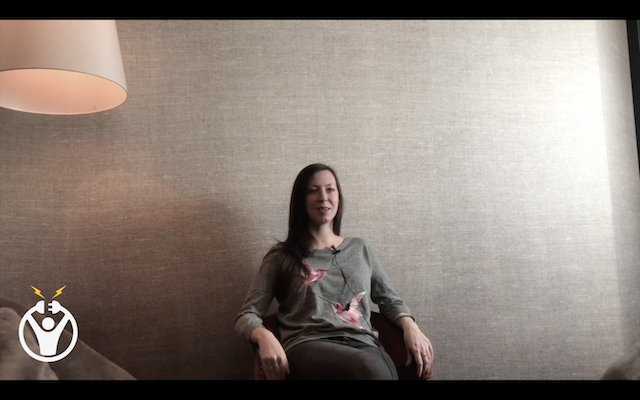Patrycja Płonka works for the Association of Municipalities Polish Network “Energie Cités” (PNEC) in Krakow, Poland. As EnergyMeasures partner PNEC engages with households in the city of Bielsko Biała to reduce their energy consumption and costs.
What is PNEC doing in the context of Energy Measures?
PNEC, the Association of Municipalities Polish Network Energie-Cité), is a non-governmental organisation that supports municipalities in the process of energy transition. We assist in planning, realization and monitoring of activities related to combating energy poverty, supporting the development of renewable energy as well as increasing the access of citizens to sustainable energy sources. In the context of Energy Measures PNEC improves energy efficiency in households, which are at risk of energy insecurity or energy poverty.
And how do you work on household’s energy efficiency?
We implemented a pilot program in the city of Bielsko Biała that offers individual and personal counselling about possible behavioural changes related to energy use, but also teaches practical skills such as how to read and interpret energy bills or where to find information about possible support funds. In Bielsko Biała we have engaged 400 households and we hope that this pilot will also serve other municipalities as a knowledge hub, which they can refer to during their own energy transition process. For us, as members of the European Poverty Advisory Hub, under which we provide consulting services to cities, the sharing of our own experiences and knowledge is very important.
What makes Energy Measures an important project in the Polish context?
The issue of energy poverty is becoming extremely widespread in Poland and in Europe. Many households spend most of their income on energy related expenses, but at the same time still find it difficult to meet their basic needs. Due to the fact that energy prices and inflation are increasing, the scale of this problem is becoming bigger and its negative effects are extensive and diverse. The effects include economic hardships, societal pressure, stigmatisation, lack of money for better insulation or use of old stoves, where trash and other toxic materials are burnt. EnergyMeasures helps to support and advise those people, but also assists municipalities in creating a good, trustful relationship with their citizens.
EnergyMeasures engages with households in eight European countries. What’s specific about the situation in Bielsko Biała?
In the case of Bielsko Biała, the local municipality is very much involved in our pilot project and remains close to the inhabitants, trying to understand their needs and finding ways on how to help them.
How do you find households that are affected by energy poverty and would be interested in taking part in the energy measures project?
This was and still is one of the biggest challenges in our project. One of the biggest obstacles for recruiting households was a lack of nationally standardized definition of energy poverty in Poland, but also a huge stigmatization associated with this term. We had to be really careful how we approach households and individuals and what language we use with them, for example we have purposefully avoided the term energy poverty when approaching citizens directly.
Nevertheless our strategy was to identify areas, where financial hardships could be the strongest and individuals, who are most likely to suffer from energy poverty such as people living in old buildings with a bad or old heating installation or poor technical solutions, people who use the services of social funds, citizens in housing communities or inhabitants of poorer areas of the city.
Our methodology was to go out and visit people personally. We realized that social media campaigns, flyers or posters were not as effective as we had hoped in the first place. We visit citizens in their homes, go from door to door, join local events and show presence at social gatherings.
What is people’s biggest motivation to join the EnergyMeasures project?
Curiosity towards what can be achieved through this project. People realize that the project goes deeper than just raising awareness, but also takes actions that help decrease energy consumption and most importantly costs of energy for households. Participants were also motivated to gain knowledge about how to read their invoices and bills, how to get funding or where to seek information about modernization of existing heat installations and what discounts are available.
We have also organised a little contest for households, where they can win some prices if they decrease their energy consumption. This is important for us mainly because these households allowed us to track their energy consumption for this upcoming year and thanks to that we can monitor the effectiveness of our actions.
What do you think will be the effects of EnergyMeasures?
What we strive for is for citizens to be able to autonomously have a grasp on their energy activity, have knowledge on how to reduce their energy consumption and improve their energy comfort. The level of knowledge of citizens on this topic is, unfortunately, still quite low and they are often very helpless knowing that their basic needs are not met, but they still pay a lot of money. Therefore my opinion is that one of the most important effects will be not only bringing theoretical knowledge to citizens, but also translating that into practical skills, which will result in an overall decrease in energy consumption and use of more sustainable energy sources.
However one of the effects, which we already see is that many other municipalities, which observed the pilot project organised in Bielsko Biała, have started to replicate this model. They are putting more effort in creating a more personal connection with their citizens in the context of energy counselling. It is great to see that the knowledge we have collected in Bielsko Biała can be used elsewhere and that other municipalities are adjusting are methods through building on our successes and avoiding our mistakes.
